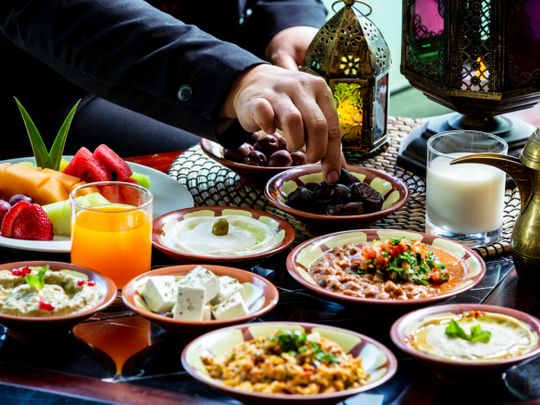
Abu Dhabi: After a sumptuous iftar and nightly activities, it may seem like an attractive proposition for many residents to sleep through the night during Ramadan and skip the pre-dawn meal called suhour. Doctors have, however, strictly advised against skipping suhour, saying that the meal is the key to healthy and successful fasting.
Key to healthy fasting
“Suhour is a cornerstone for successful fasting as it provides you with the necessary energy for the rest of the day. This pre-dawn meal is essential to curb thirst and hunger. Skipping it is not recommended as it prolongs fasting time and leaves [the worshipper] feeling tired and dehydrated during the day. In addition, this can also increase the tendency to overeat during Iftar, putting people at risk of unhealthy weight gain,” said Dr Einas Khojaly, internal medicine specialist at Burjeel Hospital, Abu Dhabi.
“Suhour is the energy-producing meal and is the most important meal of the day [for a person who is fasting]. The right suhour makes fasting easier and tolerable. Skipping suhour can place the body in ‘starvation mode’, which may result in muscle breakdown and extreme fatigue. It can also cause dehydration, bad breath, sluggishness and lack of concentration,” added Dr Nisar Ahmed Bathoolunnisa, manager of dietetics at the Sheikh Shakhbout Medical City.
Especially important for some
For a person who is fasting, iftar and suhour are the two main meals, each designed to make the dawn-to-dusk fasting sustainable. Iftar is prescribed at the end of the fast to replenish the worshipper, whereas suhour must be eaten before beginning the abstinence from food and drink.
Unfortunately, while people spend a good amount of time preparing for iftar and indulging in it at the end of fasting, they often fail to prioritise suhour. And for certain groups of people, this may make fasting far more difficult, or even unhealthy.
Dr Bathoolunnisa said skipping suhour can trigger very low blood sugar levels in people with diabetes. “People with diabetes must [therefore] be cautious and fast in a safe manner. Consuming a meal before dawn will help them maintain good blood sugar levels throughout the day and minimise the risk of hypoglycemia,” Dr Khojaly added.
Similarly, the pre-dawn meal is especially important for young children who are not used to being hungry and for those who do intensive work during the day while fasting. In fact, it is not recommended to skip suhour even for people who choose to get enough hours of sleep in its place.
Balancing sleep
“Skipping suhour, which is one of the two main meals during the holy month, is not advisable for anyone, even for people with sleep disorders. It is better to go to bed earlier and delay suhour as much as possible, as this can also allow you to get enough sleep,” Dr Khojaly said. “The pre-dawn meal is also very important for patients with gastritis. If they stay hungry for a long time, excess acid formation in an empty stomach can aggravate their pain,” she warned.
“Avoid late night gatherings and try to sleep for at least four hours at night after iftar. After suhour and the Fajr prayer, return to sleep for a couple of hours before getting up for the day,” Dr Batholunnisa recommended.
When to eat
There is also a recommended time for consuming suhour, despite the wide variations of time at which people sit down for the meal.
Dr Bathoolunnisa said the “best practice” is to have suhour close to dawn. This is also in keeping with the advice of most religious scholars. “We are instructed to delay suhour as much as we can so that our reserve of energy will last longer,” Dr Khojaly said.
Eating suhour right
Residents should eat a healthy and balanced meal at suhour, opting for foods that are nutrient-dense. Essentially, suhour should be eaten like breakfast, with slow-burning food choices that can sustain the fasting person for the day.
In addition, residents should also avoid only drinking water at suhour.
“Fluids are also essential during the month of fasting, but consuming a large quantity of water only during suhour is not enough to hydrate and sustain us throughout the day as we don’t have the ability to store water. Therefore, it would be best to keep drinking as much water as possible after Iftar. Try to drink at least two litres of water to stay hydrated throughout the day,” Dr Khojaly advised.
What to eat:
- Carbs equivalent to one cup of rice, one cup of spaghetti, two slices of bread, half a loaf of Arabic bread, or one bowl of wholegrain cereal.
- Proteins equivalent to four cheese slices, 60 grammes of meat, two eggs, one small plate of labneh, or one cup of legumes.
- Assorted vegetables.
- A fresh fruit.
- One glass of milk or yoghurt.
- Enough water.
Recommended dishes:
- Oatmeal pudding with milk and strawberries.
- Peanuts with toast and a cup of milk.
- Poached egg with bread.
- Frozen yoghurt with fruit.
What to avoid:
- Steer clear of caffeinated beverages, as they can increase your thirst.
- Avoid anything deeply fried containing a lot of oil and greasy, as well as spicy dishes and foods containing high sugar or salt content. Rich foods at suhour can cause indigestion and heartburn, and promote thirst.
- Avoid sugary fluids and sodas that can leave you feeling thirsty during the day.
- Desserts are also best skipped at suhour.
- Avoid salty pickles or nuts that can also leave you feeling thirsty.














